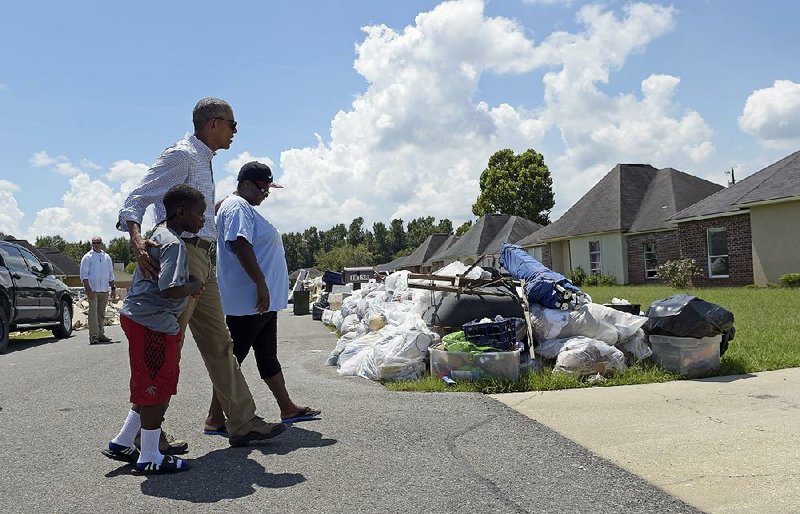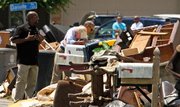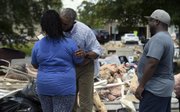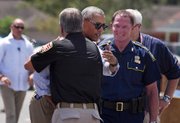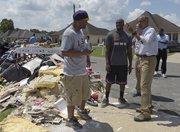ZACHARY, La. -- President Barack Obama on Tuesday promised a sustained national effort to rebuild flood-ravaged southern Louisiana "even after the TV cameras leave."
"This is not a one-off, this is not a photo-op issue. I need all Americans to stay focused on this," he said. "I know how resilient the people of Louisiana are and I know that you will rebuild again."
As he toured a battered neighborhood and spoke to local officials, Obama tried to buck up beleaguered residents of the water-soaked region.
"These are some good people down here," Obama said. "They got a lot of work to do, and they shouldn't have to do it alone."
[VIDEOS: Click here for videos of the flooding in Louisiana]
The president described one elderly woman who had lost her daughter and was living alone but was being helped by the son of one of her neighbors.
He said he spoke with another young woman whose husband had died shortly after the birth of her second child. The woman told Obama that her daughter was trying to salvage keepsakes that reminded her of her father from her flood-damaged room.
"This is not just about property damage," Obama said. "It is about roots."
City and state officials from both political parties have praised the federal response in Baton Rouge, drawing a sharp contrast with the much-criticized delays by the Federal Emergency Management Agency after Katrina.
The White House said $127 million in federal aid had been designated for temporary rental assistance, essential home repairs, and flood-insurance payments. More than 115,000 people have registered for federal disaster aid, with the state saying $20 million has been distributed to individuals so far. At least 40 state highways remained closed.
Lt. Gov. Billy Nungesser of Louisiana, a Republican who frequently criticizes Obama, said in an interview that federal officials had done "an excellent job" responding to the floods. "They've gotten good at it, and they actually do care," he said.
Frustration, gratitude
Eleven years after Hurricane Katrina ravaged New Orleans, Obama's visit was a reminder of the political dangers and opportunities natural disasters pose for politicians.
The president has been criticized for waiting until after he returned from his New England vacation to tour the Gulf Coast flooding. The timing, during a heated presidential campaign, drew barbs from some Louisiana officials and Republican political opponents, including GOP presidential nominee Donald Trump.
Obama's visit came four days after Trump visited flood-ravaged areas around Baton Rouge. In a tweet on Tuesday, Trump derided the president for not cutting short his Martha's Vineyard vacation last week. "President Obama should have gone to Louisiana days ago, instead of golfing. Too little, too late!" Trump wrote.
It was a sentiment repeated by people in the area, many of whom have said they feel their plight has been ignored.
"Too little too late," Mona Gaspard said of Obama's visit. The resident of Ascension Parish said she saw her home filled with 4 feet of water and resented what she saw from Obama. "I saw him play golf, not helping out over here. Trump was over here, but he wasn't," she said.
White House spokesman Josh Earnest said the president ignored the criticism.
"We're talking about lives lost. We're talking about a community being upended," Earnest said. "It's an appropriate time to put politics aside, and actually focus on our responsibilities as Americans."
But frustration over the president's absence merged with a widespread sense that the disaster has been unjustly overshadowed by coverage of the Summer Olympics and the presidential election.
"When there's a crisis anywhere and the federal government's involved there needs to be a presence," said Evita Couvillion, 59, whose props, sets and books from her 35 years as a school drama teacher were piled in black bags out in front of her flood-ruined home in Baton Rouge. She said she had not watched much news since her rescue on a boat a week and a half ago, but saw the negativity across Facebook.
"I'm thankful that they're here," she added of the presidential visit, but of the three hours scheduled, added: "That doesn't seem like much."
Others were ambivalent. "Politics should be out of this," said Florence Lucas, 79, who added that an earlier visit by the president would have just complicated the work of local responders and police.
"What can he do? He can't come and get rid of the water," she said.
Some, however, welcomed Obama and the spotlight he drew.
"It means a lot to know you have that support from the highest level," said Chrisena Brown, as the president surveyed the piles of discarded mattresses, broken appliances and heaps of clothing that line the curbs of her street. The college administrator says she's staying with family members while she cleans up, working late into the night in stifling humidity.
At the Saintsville Church of God in Christ, across the street from the airport where Obama arrived, volunteers unloaded a truck full of supplies driven in by a church from Milwaukee. As they worked, dozens of police motorcycles lined up at the edge of the church parking lot, part of the motorcade that would escort the president.
The volunteers walked to the edge of the parking lot to see if they could spot the president. LueDora Stampley-Simms said she was excited about the president's arrival.
"I think he has to see it to understand," she said. "Then he can tell the insurance companies and FEMA to do what they have to do to help people."
Politics of disasters
Going door to door and trailed by cameras, Obama offered sympathy to residents as they took a break from the cleanup.
"I wish I was coming at a better time," he told one resident, as he put his arm around her and walked into her home for a brief tour. "But I'm glad to see everybody is safe, at least."
Obama is hardly new to the potent politics of such moments. As a candidate in 2008, he was a sharp critic of President George W. Bush's response to Hurricane Katrina. And in 2012, the year of his re-election effort, he rushed to Louisiana to show solidarity with victims of Hurricane Isaac.
Obama said Tuesday that he doesn't "worry too much about politics" and that he is focused on improving the speed and efficiency of the federal response.
Louisiana officials aimed for bipartisan support and unity as they turned to the task of rounding up federal money for their state. A large group of officials met the president at the airport, including Louisiana Gov. John Bel Edwards, a Democrat; Nungesser, the lieutenant governor; and Republican Sens. Bill Cassidy and David Vitter.
"I'm just glad he's here," Nungesser told MSNBC in an interview as Obama departed the airport for the flood zone. "It's going to be a long haul. We're going to need a lot of help, a lot of prayers, and a lot of work to get back."
In a letter to Obama, Edwards asked the president to reduce Louisiana's share of the response costs from 25 percent to 10 percent, to fully cover the Louisiana National Guard's response costs and to seek disaster block-grant aid for the state from Congress.
"While we do not doubt the ability of our citizens to recover, we need the help of the federal government," Edwards said in a statement. Edwards, who had urged the president not to visit the state when the rescue operation was in full swing, said the federal government so far has been "responsive to all of our requests."
The governor estimated flooding has ravaged "well over 100,000 homes" across south Louisiana -- on top of 29,000 homes that received damage in a March flood in northern parts of the state.
Edwards had said Obama was better off timing his visit until after the cleanup was underway, so as not to pull resources away from the effort. Democratic presidential nominee Hillary Clinton issued a statement Monday saying she would visit "at a time when the presence of a political campaign will not disrupt the response, to discuss how we can and will rebuild together."
Before leaving Louisiana, Obama paid another visit he has been criticized for delaying. The president met privately with the family of Alton Sterling, a black man whose death last month in a police shooting sparked protests and mass arrests. Obama also met with the families of officers killed or injured nearly two weeks later by a gunman, apparently in response to Sterling's killing, the White House said.
Obama was criticized for not visiting Baton Rouge after those slayings, although he went to Dallas to eulogize five police officers killed in another attack targeting law enforcement officials.
Information for this article was contributed by Kevin Freking, Kathleen Hennessey, Rebecca Santana and Melinda Deslatte of The Associated Press; by Campbell Robertson and Michael D. Shear and Alan Blinder of The New York Times; and by Ashley Cusick and Greg Jaffe of The Washington Post.
A Section on 08/24/2016
